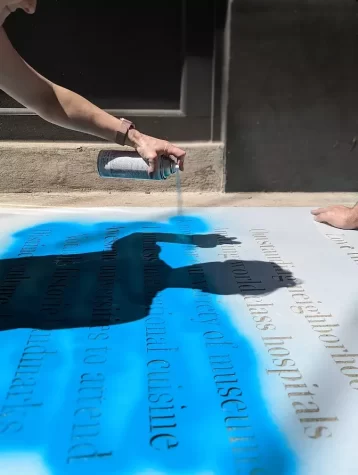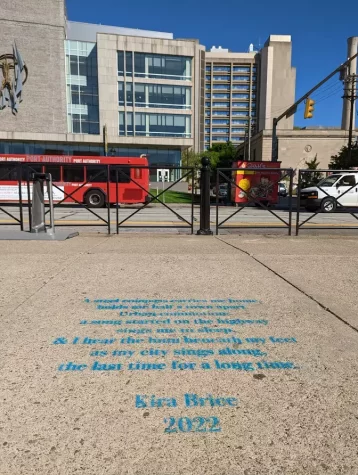‘The power of art in everyday spaces’: Local poets celebrate Oakland’s past, present and future in new OBID sidewalk poetry project
Image courtesy of Leah Friedman
A sidewalk poem being made with pink spray paint.
August 25, 2022
Hot sunshine wasn’t the only thing brightening Oakland’s sidewalks this summer. Stencils and spray paint brought verses of poetry in vibrant pinks, purples and blues to the neighborhood’s normally gray walkways.
These poems are part of Oakland Business Improvements District’s new sidewalk poetry program. OBID first completed this project in May when staff spray painted the poems of 22 contest winners on Oakland sidewalks using stencils. Sidewalks are a critical location for reflection, according to Cate Irvin, the former director of placemaking and activation for OBID’s sidewalk poetry project.
“Sidewalk poetry embeds the power of art into our everyday spaces,” Irvin said. “Especially during the pandemic, our sidewalks have become critical spaces for contemplation, fresh air and socializing.”

(Image courtesy of Leah Friedman)
Leah Friedman, the marketing and communications manager of OBID, said the group started the project to celebrate April as National Poetry Month, inspired by the work of artist Marcus Young in St. Paul, Minnesota.
Young created a sidewalk poetry project in 2008 when he worked as the City Artist with Public Art Saint Paul, a private non-profit that works alongside the City of St. Paul to transform public spaces in engaging ways.
OBID began the program in fall 2021 with a contest asking for submissions of short poems about “Oakland’s past, present and future.” A committee of seven jurors selected 25 winning poems out of 82 submissions. Lisa Kay Schweyer, a program manager for the transportation research institute Traffic21 at Carnegie Mellon University, served as one of the jurors and as a contributing poet. Schweyer said the jurors reviewed a spreadsheet that listed the poems without including any names or identifying information of the poets.
After three rounds of reviewing, the committee chose 25 poems, which are compiled in an online booklet. The OBID website also has a map showing each poem’s location in Oakland.
The pandemic played an important role in not just the inspiration for the project, but in the inspiration for some of the poets as well.
Local writer and contributing poet Jessica Manack said she was inspired by her experience as a mother raising two young kids during the pandemic.
“We have just taken so many walks around our neighborhood, especially thinking of the very early stages of pandemic and lockdown and my kids are both learning to read, and they just look for words in the world around them,” Manack said. “So with this poem, I really wanted to create something that a small child could find and read.”
Manack’s poem is located near Rita’s Italian Ice on Forbes Avenue. She said she can easily imagine a happy child bopping along with their ice cream, stopping to read the words in their familiar rhyming pattern.
“Trains chug, / bikes zoom. / Trucks lug, / cars vroom,” Manack’s poem reads.
Manack’s poem wasn’t the only one to focus on Oakland’s bustling urban movement. Contributing poet Sarah McMullen, director of senior leadership projects at Pitt, likens the movement of Oakland to the beating of a heart in her poem, “Oakland Pulse.”
“Thump thump / Feet on the concrete / The pulse of timeless advance,” McMullen writes in her poem “Oakland Pulse.”
McMullen cites the “constant movement” of Oakland similar to a “pulse” as her inspiration for the poem.
“I’ve always been struck by Oakland’s ability to be old and new at the same time. We have the dinosaurs on one side of the street and cutting edge science on the other side,” McMullen said. “There’s also a constant movement to the sidewalks and the streets, feet in all directions, with a main road going one-way in each direction.”
The description of Oakland as a heart appears again in another sidewalk poem, this one on the corner of Fifth Avenue and Bigelow Boulevard and written by former Pitt student Kira Brice.
“In the beating heart of the city / illuminated highways intertwine,” Brice wrote.

Brice first wrote the poem she submitted for the contest during her time as a Pitt student. When she saw the ad for the contest, she felt that it was calling her directly.
“I’m not originally from Pittsburgh, and when I came to Pitt for college, I felt out of place at first. Reflecting upon that has made me think broadly about place in general. What does it mean to be out of place?” Brice said. “I was proud of these poems already, and I knew that they best represented my experiences in Oakland and how I felt living here.”
Many of the poems came from former Pitt students like Brice. Former student and contributing poet Erica Hom said her poem drew from her experience as a literature student at Pitt.
“It was important for me to pay homage to the literary disciplines that influenced me, as well as the strangers and classmates who eventually became my friends and chosen family,” Hom said.
Lily Keener, who is finishing her master’s degree in library science at Pitt, said her poem, located near the corner of Fifth Avenue and Thackeray Avenue, came to her on the way to class. Like many of the other poets have, she lovingly references “Cathy” in her poem.
“Morning fog descends on Oakland / hides Cathy in its arms,” Keener wrote.
Keener said when she wrote the poem it was a “typical gray Pittsburgh morning.”
“It sparked something in me, and I scribbled what became my poem in the back of my class notebook,” Keener said.
Friedman said OBID plans to continue the project and will open submissions for a new contest in the fall. She also said to look out for “a big exciting public art installation” in Schenley Plaza in the fall.



